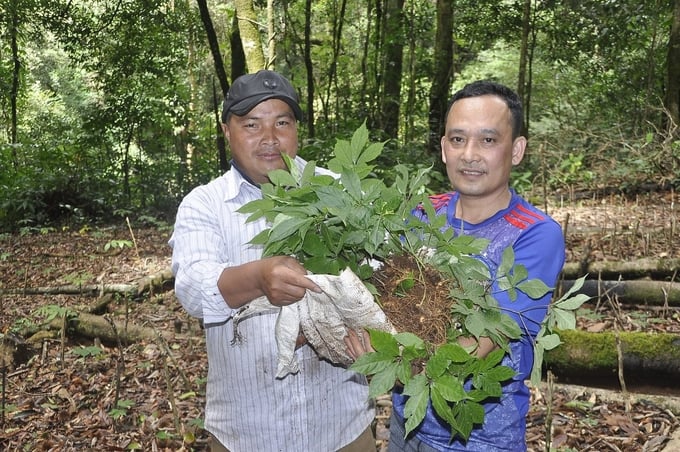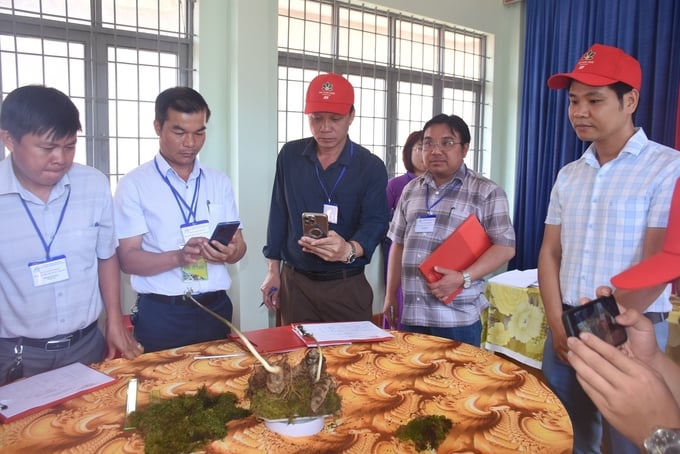November 27, 2025 | 11:17 GMT +7
November 27, 2025 | 11:17 GMT +7
Hotline: 0913.378.918
November 27, 2025 | 11:17 GMT +7
Hotline: 0913.378.918

Ngoc Linh ginseng is cultivated by local residents on the Ngoc Linh Mountain summit in Tu Mo Rong District, Kon Tum Province. Photo: Tuan Anh.
The Department of Science and Technology of Kon Tum Province has recently organized the announcement and issuance of geographical indication certification for the use of the term "Ngoc Linh" for ginseng root products to Ngoc Linh Kon Tum Ginseng Joint Stock Company (Kon Tum City, Kon Tum Province) and Ngoc Linh Tu Mo Rong Kon Tum Ginseng Joint Stock Company (Tu Mo Rong District, Kon Tum Province).
Accordingly, Ngoc Linh Kon Tum Ginseng Joint Stock Company is authorized to use the geographical indication "Ngoc Linh" for ginseng root products with 10,000 trees aged 10 years and above. Meanwhile, Tu Mo Rong Ngoc Linh Ginseng Joint Stock Company is authorized to use the geographical indication "Ngoc Linh" for ginseng root products with 2,200 trees aged 6 years and above.
The certified companies must adhere to the proper management regulations for using the geographical indication "Ngoc Linh" for ginseng root products as per the decision. The Kon Tum Province Medicinal Plant Association is responsible for issuing, managing, and affixing the geographical indication labels "Ngoc Linh" for companies based on the quantity of ginseng roots harvested.
Upon the issuance of the geographical indication certification, the Department of Science and Technology of Kon Tum Province requires the companies to harvest the correct quantity and grow Ngoc Linh Ginseng in the designated areas as stipulated. Furthermore, the companies must collaborate with relevant authorities to carry out the labeling and affixing of geographical indication labels before bringing the products to the market. Additionally, the companies are also required to maintain a logbook to track the harvesting process of ginseng roots for monitoring purposes.
Mr. Huynh Trung Kim, Deputy Director of the Department of Science and Technology of Kon Tum Province, stated that currently, counterfeit Ngoc Linh Ginseng is flooding the market. The issuance of geographical indication certification will help authenticate companies genuinely cultivating Ngoc Linh Ginseng within the geographical indication area and meeting the necessary criteria for market release.
In the near future, the Department also suggests that Tu Mo Rong and Dak Glei districts (located within the Ngoc Linh Ginseng geographical indication area) guide local residents in forming groups of ginseng growers to move towards obtaining the geographical indication.
By creating these local grower groups, the districts are striving to achieve a multiplicity of benefits that span beyond individual ginseng cultivation. The endeavor aligns with the overarching goal of safeguarding and enhancing the reputation of Ngoc Linh Ginseng as a distinguished regional product. The formation of these groups is anticipated to foster a sense of collective responsibility and commitment to adhering to the stringent criteria set by the geographical indication. Through this unified approach, the districts aim to ensure that the cultivation and production processes conform to the distinct characteristics and qualities attributed to Ngoc Linh Ginseng.

Ngoc Linh ginseng roots will undergo strict inspection and supervision. Photo: Tuan Anh.
Regarding the inspection and supervision efforts, Mr. Kim stated that relevant authorities, when inspecting the circulation of Ngoc Linh Ginseng in the market, will consider cases without documented origin and geographical indication certification as violations, potentially misleading consumers.
Furthermore, if the authorities suspect that Ngoc Linh Ginseng does not comply with the specified geographical indication, samples of leaves, stems, and roots will be sent to the Kon Tum Province Center for Research, Application, and Science and Technology Services for analysis, including DNA testing and assessment of the quality of Ngoc Linh Ginseng. If counterfeits are discovered, decisive actions will be taken.
Currently, the center has also completed the equipment setup for two quality verification systems for Ngoc Linh Ginseng, with an investment of 13 billion VND. These systems include equipment for extraction, replication, and verification of the biological active ingredient Saponin in Ngoc Linh Ginseng. They aim to facilitate specialized quality checks for ginseng products within the province.
"In addition to serving government management, organizations, and businesses, even consumers who seek quality verification of Ngoc Linh ginseng can submit samples for identification of genuine products. This will enhance trust in choosing Ngoc Linh ginseng products," Mr. Huynh Trung Kim said.
Translated by Nguyen Hai Long

(VAN) As floodwaters recede, a vast network of irrigation works across eastern Gia Lai is emerging in a state of severe disrepair, with extensive damage demanding urgent restoration ahead of the 2025-2026 winter-spring cropping season.

(VAN) The conference reviewing three years of implementing Decision 911 identified the need to prioritize improving marine environmental quality and promoting sustainable fisheries development.

(VAN) Le Hoai Trung, Member of the Communist Party of Viet Nam Central Committee and Minister of Foreign Affairs, held talks with Vi Thao, Chairman of the Guangxi Zhuang Autonomous Region (China) this week.

(VAN) The Mekong River Commission adopts the 2026 - 2030 Strategic Plan with a people-centered approach.
/2025/11/26/1720-1-200855_132.jpg)
(VAN) Viet Nam and Japan have many conditions to expand cooperation on climate change adaptation, particularly in disaster risk management based on advanced technologies.

(VAN) The strong development of digital technology and artificial intelligence is opening up opportunities to transform science and technology into a 'Magic eye' for disaster forecasting and early warning.

Applying vaccines and proactive disease prevention helps pig herds stay healthy, maintain productivity, reduce risks, and decrease reliance on antibiotics in modern livestock farming.